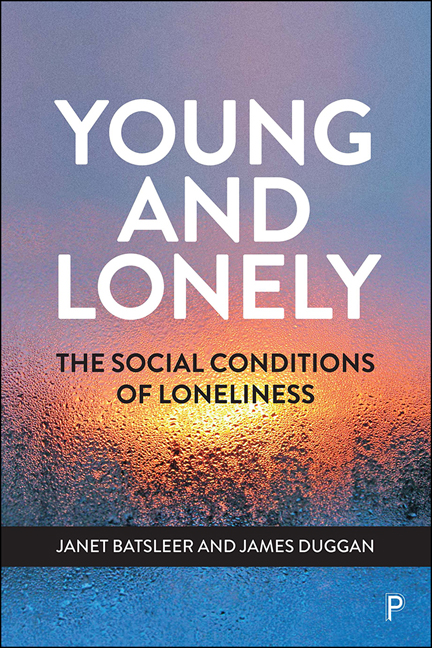Book contents
- Frontmatter
- Contents
- Notes on the Authors
- Acknowledgements
- Preface
- 1 Animate, Attune, Amplify
- 2 Finding Oneself a Loneliness Agenda
- 3 I’M New Here: Creating a New Research Project and A Young Person Led Research Agenda
- Part I The Social Conditions of Loneliness
- Part II The Experience of Loneliness
- Part III Building Friendship and Connection
- References
- Index
4 - Loneliness and Poverty
Published online by Cambridge University Press: 18 March 2021
- Frontmatter
- Contents
- Notes on the Authors
- Acknowledgements
- Preface
- 1 Animate, Attune, Amplify
- 2 Finding Oneself a Loneliness Agenda
- 3 I’M New Here: Creating a New Research Project and A Young Person Led Research Agenda
- Part I The Social Conditions of Loneliness
- Part II The Experience of Loneliness
- Part III Building Friendship and Connection
- References
- Index
Summary
In one form or another, a discussion of the impact of poverty on young people's lives and experience of loneliness emerged in every setting the research team engaged in.
The proportion of children living in poverty has been rising. These rises have been documented in great detail by the UK Government– funded Economic and Social Research Council's Poverty and Social Exclusion team (Dorling, 2018), as well as by the Joseph Rowntree Foundation (JRF). Peter Townsend, the sociologist who did so much to advance our understanding of poverty and its relationship to wider society, was also one of the founders of the Child Poverty Action Group. In 1979 Townsend defined poverty as follows, highlighting that poverty is about a lack of resource. This resource is certainly financial, but it also includes a lack of access to good education and healthcare and to positive and trustful communities:
Individuals, families and groups in the population can be said to be in poverty when they lack resources to obtain the type of diet, participate in the activities and have the living conditions and amenities which are customary, or at least widely encouraged and approved, in the societies in which they belong. (Townsend, 1979, p 31)
The JRF is a highly respected think tank that presents evidence about poverty in the UK to policy makers. Their definition of poverty is ‘when a person's resources are well below their minimum needs, including the need to take part in society’ (JRF, 2016). In 2008, the JRF published the Minimum Income Standard (MIS) – the benchmark of minimum needs based on what goods and services members of the public think are required for an adequate standard of living. This includes food, clothes and shelter; it also includes what we need in order to have the opportunities and choices necessary to participate in society. According to the JRF, today in England there are 4.1 million children classified as poor (JRF, 2018). This means that they are unable to take part in the norms of society and their parents or guardians are unable to purchase items which the majority of the population consider to be necessities.
- Type
- Chapter
- Information
- Young and LonelyThe Social Conditions of Loneliness, pp. 39 - 50Publisher: Bristol University PressPrint publication year: 2020

